| Record companies, artists and publicists are invited to submit CDs to be considered for review. Send to: Jerry Bowles, Editor, Sequenza 21, 340 W. 57th Street, 12B, New York, NY 10019 |
Latest Posts
From one of our own
The Best of Times, The Worst of Times
more number pieces by john cage from ogreogress productions
I've Got Good News and Bad News ...
Music for the Young from Marion Bauer
Intimate Music from Joan Tower
Terry Riley's Assassin Reverie
A Couple of Crowd Pleasers ...
Vox populi; Vox musica
The Exquisite Hour
Record companies, artists and publicists are invited to submit CDs to be considered for our Editor's Pick's of the month. Send to: Jerry Bowles, Editor, Sequenza 21, 340 W. 57th Street, 12B, New York, NY 10019



|
Archives
Saturday, December 18, 2004
Saturday, December 25, 2004
Friday, December 31, 2004
Wednesday, January 05, 2005
Monday, January 10, 2005
Thursday, January 13, 2005
Thursday, January 20, 2005
Sunday, January 23, 2005
Monday, January 24, 2005
Saturday, January 29, 2005
Wednesday, February 02, 2005
Thursday, February 03, 2005
Monday, February 07, 2005
Tuesday, February 08, 2005
Friday, February 11, 2005
Monday, February 14, 2005
Wednesday, February 16, 2005
Tuesday, February 22, 2005
Monday, February 28, 2005
Sunday, March 06, 2005
Monday, March 07, 2005
Wednesday, March 09, 2005
Sunday, March 13, 2005
Friday, March 18, 2005
Monday, March 28, 2005
Saturday, April 02, 2005
Monday, April 11, 2005
Sunday, April 17, 2005
Tuesday, April 19, 2005
Monday, April 25, 2005
Monday, May 02, 2005
Monday, May 09, 2005
Tuesday, May 17, 2005
Tuesday, May 31, 2005
Monday, June 06, 2005
Thursday, June 16, 2005
Sunday, June 19, 2005
Sunday, July 10, 2005
Wednesday, July 13, 2005
Sunday, July 24, 2005
Friday, July 29, 2005
Monday, August 08, 2005
Monday, August 22, 2005
Wednesday, August 24, 2005
Friday, September 16, 2005
Sunday, September 25, 2005
Tuesday, October 04, 2005
Tuesday, October 18, 2005
Monday, October 24, 2005
Tuesday, November 01, 2005
Monday, November 07, 2005
Saturday, November 12, 2005
Wednesday, November 16, 2005
Tuesday, November 29, 2005
Friday, December 16, 2005
Monday, January 09, 2006
Thursday, January 12, 2006
Thursday, January 19, 2006
Tuesday, January 24, 2006
Thursday, February 02, 2006
Monday, February 13, 2006
Wednesday, February 15, 2006
Wednesday, March 01, 2006
Sunday, March 19, 2006
Sunday, March 26, 2006
Friday, March 31, 2006
Sunday, April 09, 2006
Monday, April 10, 2006
Thursday, April 20, 2006
Friday, April 21, 2006
Thursday, May 11, 2006
Thursday, May 18, 2006
Saturday, May 20, 2006
Friday, June 02, 2006
Tuesday, June 06, 2006
Friday, June 16, 2006
Monday, June 19, 2006
Sunday, June 25, 2006
Monday, June 26, 2006
Monday, July 10, 2006
Thursday, July 13, 2006
Thursday, July 20, 2006
Friday, July 21, 2006
Sunday, July 23, 2006
Thursday, August 03, 2006
Wednesday, August 09, 2006

|
|
Tuesday, January 24, 2006
Orchestral Potpourri
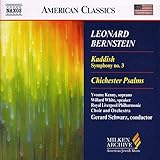 Kaddish, Symphony No. 3; Chichester Psalms Kaddish, Symphony No. 3; Chichester Psalms
Leonard Bernstein
Yvonee Kenny, Willard White, Royal Liverpool Philharmonic Choir and Orchestra with Gerard Schwarz conducting
Naxos 8.559456
 Sinfonia castellana Sinfonia castellana
Antonio José
Castile and Léon Symphony Orchestra with Alejandro Posada conducting
Naxos 8.557634
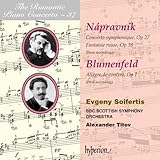 Allegro, Concerto symphonique Allegro, Concerto symphonique
Felix Blumenfeld, Eduard Napravnik
BBC Scottish Symphony Orchestra with Alexander Titov conducting
Hyperion CDA67511
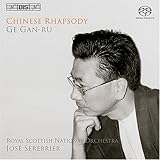 Chinese Rhapsody Chinese Rhapsody
Ge Gan-ru
Margaret Leng Tan, Royal Scottish National Orchestra with José Serebrier conducting
BIS-SACD-1509
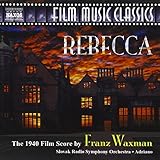 Rebecca Rebecca
Franz Waxman
Slovak Radio Symphony Orchestra with Adriano conducting
Naxos 8.557549
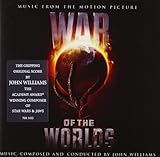 War of the Worlds: Music from the Motion Picture War of the Worlds: Music from the Motion Picture
Music composed and conducted by John Williams
Decca Records B0004568-02
It’s hard to believe that for many decades Leonard Bernstein was the most prominent and easily recognizable American composer/conductor/pianist. A flamboyant talent, ideally suited for the Television Age, Bernstein gave several generations of American children their first, and in many cases only, exposure to classical music via his wildly popular televised Young Persons’ Concerts with the New York Philharmonic. As a composer, Bernstein has not fared as well, with only his music West Side Story gaining a permanent place in the public consciousness.
This is a shame, because Bernstein was a terrifically gifted composer of chamber, symphonic, and vocal music. Gerard Schwarz and the Royal Liverpool Philharmonic Orchestra have delivered a stunning performance of Bernstein’s Symphony No. 3 (“Kaddish”) and the Chichester Psalms, both works from the 1960s. The composer’s eclecticism is readily apparent in “Kaddish,” with stylistic features ranging from Coplandesque hymnody to quasi-dodecaphonic moments. Although the rhythmic “jazzy” characteristics of Bernstein’s music are often mentioned, the concluding section of the symphony is a textbook example of contrapuntal writing. The sung Hebrew text of the Kaddish is alternated with a spoken English narration that was written by the composer. This is the only weakness of the composition, because Bernstein the poet is no match for Bernstein the composer. The narration, forcefully performed by Willard White, seems out of place juxtaposed with the timeless reverence of the Kaddish, and is reminiscent of the peace/love/flower power/self-pitying shtick of the 1960s that was dated by the end of that dreadful decade.
It had been a long time since I had listened to the Chichester Psalms, and I was glad for the opportunity to listen to this new recording with fresh ears. Bernstein’s brilliance as a composer was in finding new things to say musically about texts which had been set so many times during the past millennia. For example, in the section setting Psalm 100 (“Raise a shout for the Lord”), the composer uses a 2 2 3 rhythmic pattern very similar to Dave Brubeck’s “Blue Rondo a la Turk.”
It seems a shame that a composer who loomed so large in the American consciousness for so many years is in need of a renaissance only fifteen years after his death. This recording will go far to introduce listeners to a side of Leonard Bernstein that has been unfortunately given short shrift.
While Leonard Bernstein’s ludicrous forays into the fashionable, Upper East Side, leftwing, radical political causes of the 1960s have been hysterically chronicled by Tom Wolfe, many other composers have had less benign encounters with political radicalism. One such person was the Spanish composer Antonio José (1902-1936), who was murdered by Franco’s forces during the Spanish Civil War. I was unfamiliar with this composer until receiving this cd of his Sinfonia castellana, which is from the Spanish Classics series from Naxos. Although there is not an abundance of detailed biographical information known about the composer, we do know that after his youth in his native city of Burgos, he was awarded a grant to study music in Madrid, and from there went to Paris in the years 1925 to 1926. José also became a highly respected ethnomusicologist and collector of Spanish folksongs, and almost all of his compositions are informed by the use of traditional Castilian folksongs. The Sinfonia castellana was composed in 1923 and its use of Impressionistic harmonies and non-developmental formal structure suggest that José’s embrace of French compositional techniques preceded his Parisian sojourn, rather than being precipitated by it. For a composer whose life was so tragically cut short, José managed to develop a very mature style at an early age. This cd also contains some excerpts from his incomplete opera The Muleteer, the Suite ingenua for piano and strings, and the world premiere recording of the Marcha para soldados de plomo (“March of the Lead Soldiers”).
Hyperion’s Romantic Piano Concerto Series concentrates its latest release on the works of two neglected Russian composers, Eduard Napravnik and Felix Blumenfeld. Both composers were phenomenally influential in Russia during the late 19th and early 20th centuries, but are today almost completely unknown outside of their native country, so much so that all three compositions included on this cd receive their premiere recordings here. While Lisztian pianism informs the music of both Napravnik and Blumenfeld, these works also display a mastery of musical form. This is particularly in evidence in Napravnik’s monumental Concerto symphonique. More playful in nature is Napravnik’s Fantaisie russe that takes its thematic material from well-known Russian folksongs, in particular, “The Song of the Volga Boatman.” Pianist Evgeny Soifertis has a real affinity with this music that is amply demonstrated in this cd.
Attempts to combine Western and Oriental music have always seemed to me to be more akin to marriages of convenience rather than syntheses of disparate musical styles, techniques and aesthetics. One artist who does appear to be successfully bridging the twain between East and West is the Chinese composer Ge Gan-ru, the subject of a recent release by BIS. This cd features three symphonic works from Gan-ru’s oeuvre: Chinese Rhapsody, Wu for piano and orchestra, and Six Pentatonic Tunes for Orchestra.
Gan-ru’s compositional style is, as one would expect it to be, extremely eclectic, and ranges from Webernian minimalism to the massive block chords of Carl Ruggles. The Chinese Rhapsody is a mostly non-developmental orchestral composition in which the emphasis is placed upon changing timbres. Although this is a predominant aesthetic concern of Chinese music, this type of emphasis on tone color is not unknown in Western music, for example, the “Farben” movement of Schoenberg’s Five Pieces for Orchestra. Less effective and more dated is Wu, a composition for orchestra and piano utilizing extended techniques. Pianist Margaret Leng Tan—whose resume includes (with apologies to Schroeder) the impressive accomplishment of being the world’s first professional toy piano performer—brings a certain élan to her interpretation that is not necessarily warranted by the musical material at hand.
A study in contrasts could not be more stark than the recent release of two film soundtracks: the re-recorded version of Franz Waxman’s score to Alfred Hitchcock’s Rebecca and the official soundtrack of John Williams’ score to Steven Spielberg’s War of the Worlds. Waxman’s Rebecca score is a work of art in itself, as closely integrated to the screenplay and visual imagery of Hitchcock’s film as Mozart’s music was to Da Ponte’s libretto for Don Giovanni. John Williams, on the other hand, has had the great misfortune of being an extraordinarily gifted film composer in an era of extraordinarily bad films. There is little that can be said for the soundtrack of The War of the Worlds. It is simply a succession of “eerie” music cues that displays no character development or drama. But in all fairness to Williams, The War of the Worlds is such a wretched film that not even Mozart could have composed music to cover up its numerous defects. My advice is to rent the original version of The War of the Worlds starring Gene Barry and listen to the Capitol Records cd of Stan Kenton’s Los Angeles Neophonic Orchestra in which the pre-Jaws John Williams was able to compose unfettered by mediocre collaborators.
posted by William Grim
5:16 PM
|
|




